News
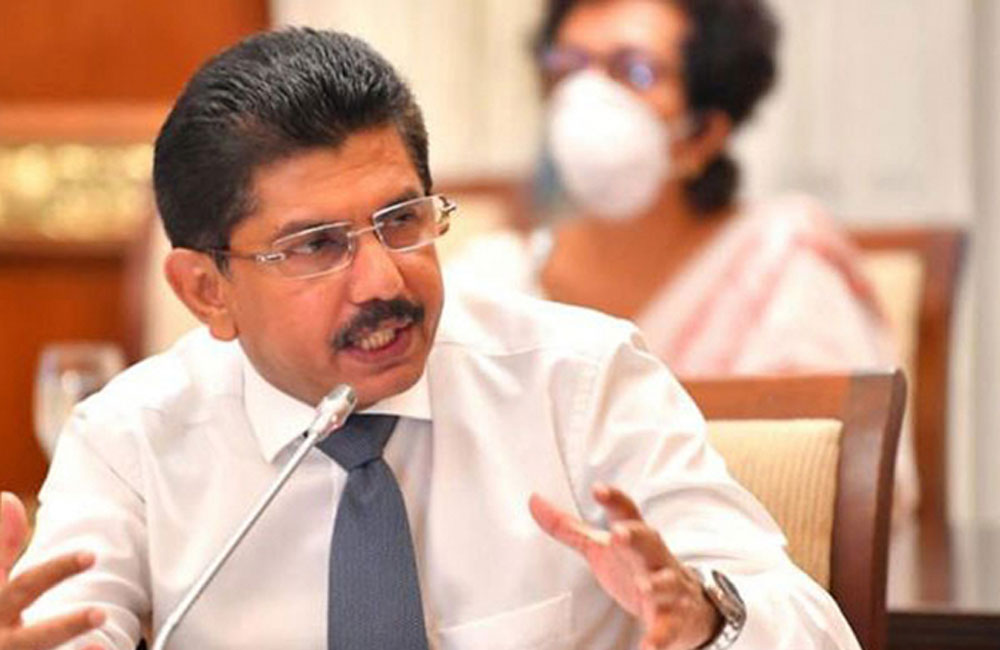
Novel SARS-CoV-2 variants not detected in Sri Lanka: Health Secretary
Novel variants of SARS-CoV-2 virus that cause COVID-19 disease have not been detected in Sri Lanka, Secretary to the Ministry of Health Dr. Anil Jasinghe has confirmed.
Issuing a special statement on the COVID-19 situation in Sri Lanka, Dr. Anil Jasinghe said in May 2025, specimens tested by the Medical Research Institute (MRI) confirmed the presence of previously identified sub-lineages of SARS-CoV-2 virus.
The Secretary to the Ministry of Health stated despite the presence of SARS-CoV-2 virus, novel variants were not detected during recent tests, and no evidence of increased severity or complications has been reported.
According to Sri Lanka’s Respiratory Surveillance System, during 2024, 3% of respiratory specimens tested for SARS-CoV-2 yielded positive results. This figure peaked at 9.6% in May 2024. The average positivity of the SARS-CoV-2 virus so far this year is approximately 2%, with a slight increase observed at present.
Thus, an increase in reported COVID-19 cases was observed in May 2024 and again in May 2025.
According to data from the World Health Organization (WHO), a global increase in the activity of the SARS-CoV-2 virus has been reported since February 2025.
Based on the International Respiratory Surveillance System, several countries, including several countries in Asia have reported a notable rise in COVID-19 cases in recent months.
Dr. Anil Jasinghe said ongoing observation and research-based monitoring are still in progress in Sri Lanka.
He said, compared to recent years, seasonal increases in respiratory illnesses like influenza are commonly observed during this period, especially under prevailing climatic conditions.
Accordingly, Dr. Jasinghe said health authorities are vigilant in monitoring disease trends, and the public need not panic unnecessarily.
He said, if individuals experience fever or respiratory symptoms, there is no need for hospital admission out of fear. However, if someone experiences difficulty breathing, medical attention should be sought, the Secretary to the Ministry of Health said.
The statement by Dr. Anil Jasinghe further said:
“It is important to maintain good respiratory etiquette and general health practices to prevent the spread of COVID-19 and other respiratory viral infections, such as influenza. Recommended measures include covering the mouth and nose with a tissue or the elbow when coughing or sneezing, avoiding unnecessary contact with the face, and ensuring frequent hand hygiene through proper hand washing or the use of alcohol-based hand sanitizers. It is also advisable to avoid touching the face with unclean hands. Individuals exhibiting symptoms of respiratory illness should wear a face mask to minimize the risk of transmitting the infection to others and avoid crowded public settings unless essential.
“Special attention must be directed towards high-risk populations, as they are more susceptible to developing complications from respiratory infections. These groups include older adults, pregnant women, and infants and young children, whose immune systems are either compromised or still developing. Furthermore, individuals with underlying medical conditions such as heart disease, chronic respiratory illnesses, diabetes, renal disease, cancer, or other chronic diseases, as well as those receiving immunosuppressive therapy, are at increased risk and require additional protection.”

Miss World 2025 : Winner announced
Opal Suchata Chuangsri of Thailand has been crowned Miss World 2025, marking a historic first win for Thailand in the prestigious international pageant. The coronation took place on 31 May 2025 at the HITEX Exhibition Centre in Hyderabad, India, where she was crowned by her predecessor, Krystyna Pyszková of the Czech Republic


Sri Lanka's President Declares War on Black Economy
Sri Lankan President Anura Kumara Dissanayake has issued a stern warning against what he described as a deeply entrenched black-market network that is depriving the state of its rightful tax revenue.
Speaking during National Tax Week, the President pledged to dismantle the shadow economy and hold all those involved accountable — regardless of their status or affiliations.
“There’s a peaceful system we see on the surface — but beneath it lies a black system,” the President said. “This network includes smugglers, corrupt officials, political actors, and even elements of the media.”
He revealed that recent customs inspections uncovered illegally imported goods from well-known brands, exposing the scale of tax evasion and regulatory violations.
The President emphasized that:
-
No one is above the law, including public officials and business elites.
-
Every rupee of tax paid by citizens will be protected.
-
Severe legal action will be taken against those who attempt to misuse public funds or evade taxes.
He called on all honest taxpayers to continue fulfilling their obligations, assuring them that the government is committed to protecting their contributions and restoring public trust in the state’s financial systems.
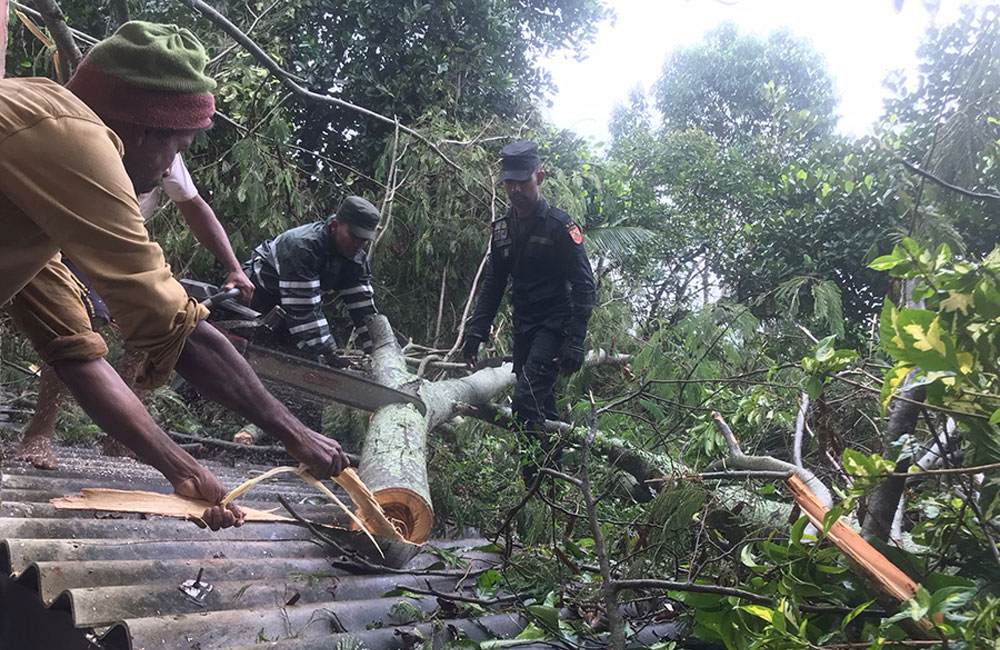
Govt to Provide Rs. 1 Bn Compensation for Disaster Victims
The Ministry of Defence says that President has allocated Rs. 1 Billion to support initial compensation efforts for homes damaged by recent strong winds.
According to K.G. Dharmathilaka, Additional Secretary of the Disaster Management Division, compensation of up to Rs. 2.5 million will be granted for homes that are completely destroyed, while partial damages will be compensated based on the severity of the destruction.
In addition, the government will provide Rs. 1 million in compensation for each person who dies as a result of the disaster.
The same amount will be granted to those who suffer permanent disabilities due to the adverse weather conditions.

New Conservation Zone to Save Endangered Bandula Pethiya
The Ministry of Environment has announced the designation of the natural habitat of the endangered freshwater fish species 'Bandula Pethiya' as a conservation zone.
This decision aligns with a series of special initiatives launched to mark International Day for Biological Diversity.
The 'Bandula Pethiya' or the Bandula barb, a freshwater fish species endemic to Sri Lanka, is found exclusively in the Galapitamada area within the Warakapola Divisional Secretariat.
The species is currently under threat of extinction due to habitat degradation and environmental pressures.
The official conservation program is scheduled to take place in Galapitamada under the leadership of Deputy Minister of Environment, Anton Jayakody.
The initiative aims to ensure the long-term survival of this rare species by preserving its natural ecosystem.
In a parallel development, the Ministry also announced that the Nilgala Forest will be formally declared a protected reserve today.
The declaration ceremony will be held at the Rathugala Indigenous Heritage Center in Bibile at 8:00 a.m., under the patronage of Minister of Environment, Dr. Dammika Patabendi.
The Nilgala Forest, which spans 40,683 hectares, includes four key conservation blocks: Madagama, Bibile, Nilgala, and Inginiyagala. The Bibile region is considered the core conservation area within the forest.
Today marks the fourth day of Sri Lanka’s Environment Week, which is being observed in conjunction with World Environment Day.
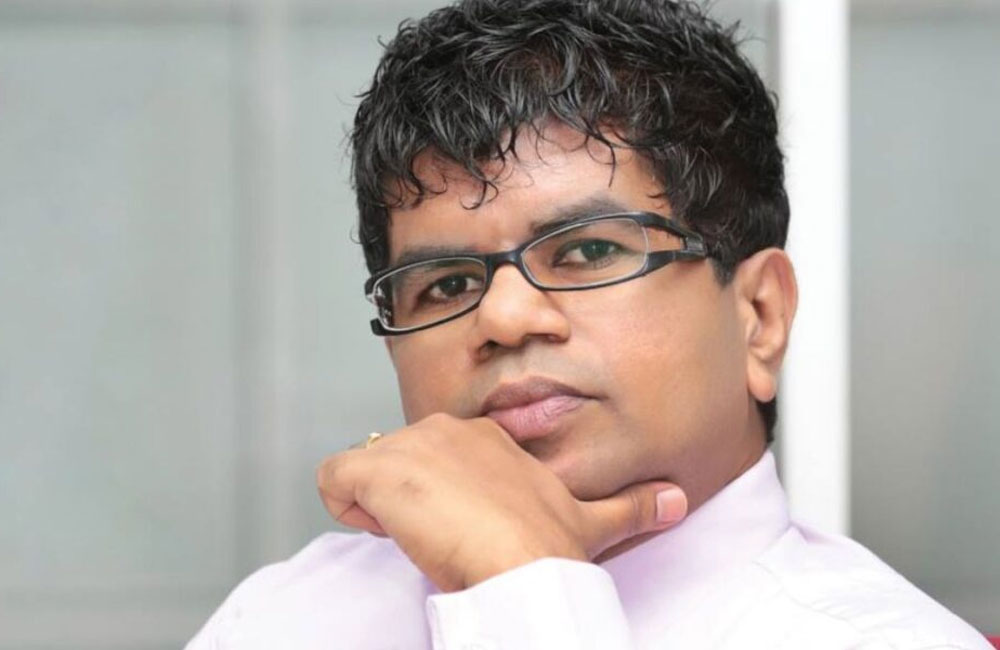
Lotteries Board case : Thusitha Halloluwa remanded
Former National Lotteries Board Director, Thusitha Halloluwa, has been remanded until 02 June over the alleged misuse of state property.
He was remanded by the Fort Magistrate’s Court today over investigations into a case filed in this regard at the court.
Halloluwa was previously arrested and released on bail on May 02 over the alleged misuse of a computer and a mobile phone valued at over Rs. 470,000 during his tenure as the Acting Director of the National Lotteries Board.
However, it is unclear whether he has been remanded today over the same case.
Meanwhile, Police investigations are also underway into a shooting that targeted Halloluwa and his lawyer in the Narahenpita area this month.
Six persons have been arrested and remanded so far in connection with the incident.
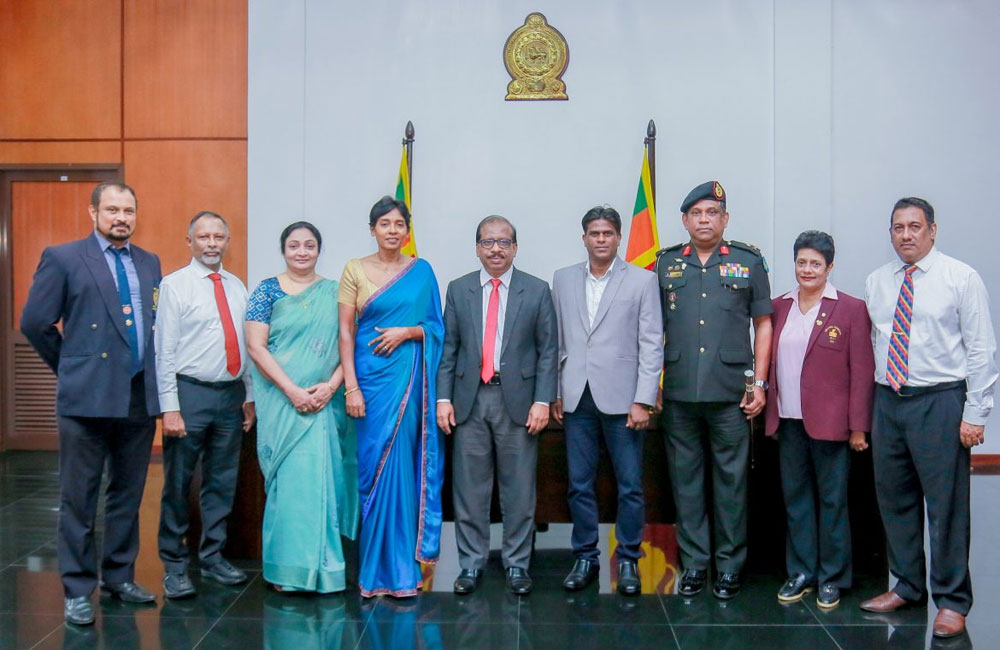
National Sports Selection Committee appointed
The National Sports Selection Committee was appointed on May 30 under the patronage of Minister of Youth Affairs and Sports Sunil Kumara Gamage and Deputy Minister of Sports Sugath Thilakaratne. The appointment took place at the Ministry of Youth Affairs and Sports.
The members of the new committee are:
-
Shriyani Kulawansa OLY, chairperson
-
Major General Ravi Pathiravithana, secretary
-
Major Rajitha Samarasekara, coordination officer
-
Kamal Gamlath, retired sports officer, Ministry of Sports
-
Ruwan Perera, deputy director of school sports, Sussex College
-
Jayamini Eleperuma, retired bank officer, Hatton National Bank
-
Suresh Subramaniam, president, National Olympic Committee
-
Anuradha Eleperuma, additional secretary, Ministry of Youth Affairs and Sports

Cannot rule out new COVID-19 variants entering Sri Lanka: Health Secretary
Secretary to the Ministry of Health Dr. Anil Jasinghe says although there is no need for the general public to panic at present, he cannot rule out new COVID-19 variants from entering the country.
Dr. Anil Jasinghe, while acknowledging the surge in the number of COVID-19 cases detected globally, noted that Sri Lanka will increase the number of PCR tests being conducted to identify the extent of the spread.
Speaking during a media briefing, Dr. Jasinghe said a special discussion was held with the participation of officials of the Epidemiology Unit and several other divisions to devise a plan to face any future epidemics.
He confirmed the number of PCR tests conducted at the Medical Research Institute, Kandy National Hospital and the Galle National Hospital will be increased.
Dr. Anil Jasinghe said NB.1.8.1 and LF.7, sub-lineages of the JN.1 COVID-19 variant are spreading across many Asia countries including India.
The Secretary of the Ministry of Health stated that the World Health Organization (WHO) has also classified NB.1.8.1 and LF.7 subvariants as variants under monitoring.
Dr. Anil Jasinghe added that health authorities are monitoring the situation and are prepared to take necessary actions based on developments.
He also said anyone having COVID symptoms such as fever, cough, chills and sore throat should wear a mask to prevent the spread.
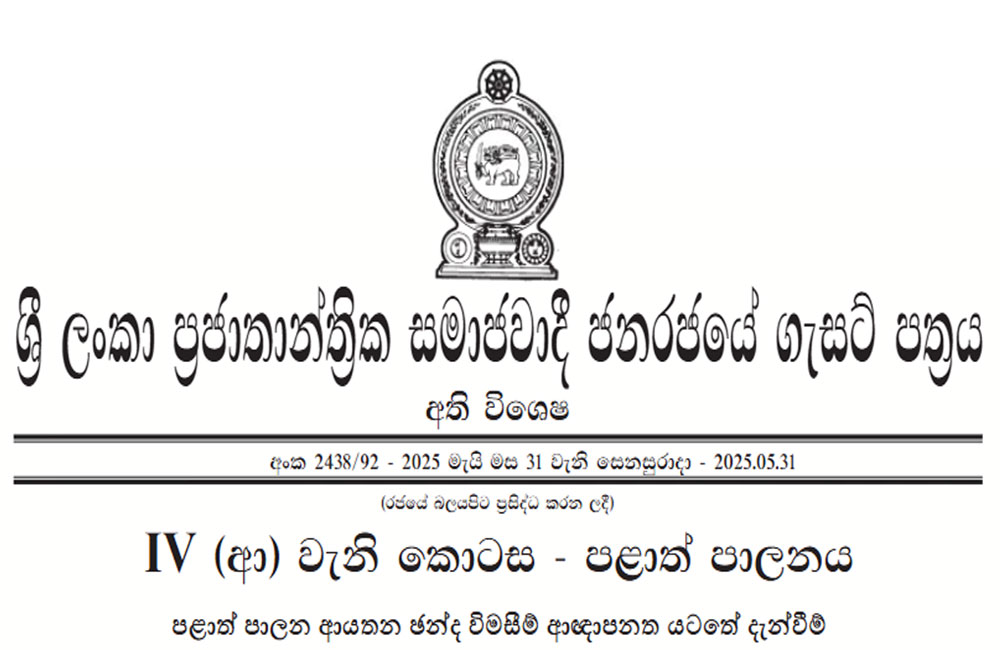
New Gazette lists Mayors, Deputy Mayors & Chairpersons
A Gazette notification has been issued naming the Mayors, Deputy Mayors, Chairpersons, and Vice Chairpersons of Local Government bodies where parties or independent groups secured a majority at the recent local government elections.
A Gazette notification has been issued naming the Mayors, Deputy Mayors, Chairpersons, and Vice Chairpersons of Local Government bodies where parties or independent groups secured a majority at the recent local government elections.
Accordingly, the Election Commission has taken steps to officially gazette the names of individuals appointed to these positions in 21 districts, based on the parties and groups that emerged victorious
Accordingly, the Election Commission has taken steps to officially gazette the names of individuals appointed to these positions in 21 districts, based on the parties and groups that emerged victorious
Full Gazette Notification:
https://documents.gov.lk/view/extra-gazettes/2025/5/2438-92_E.pdf
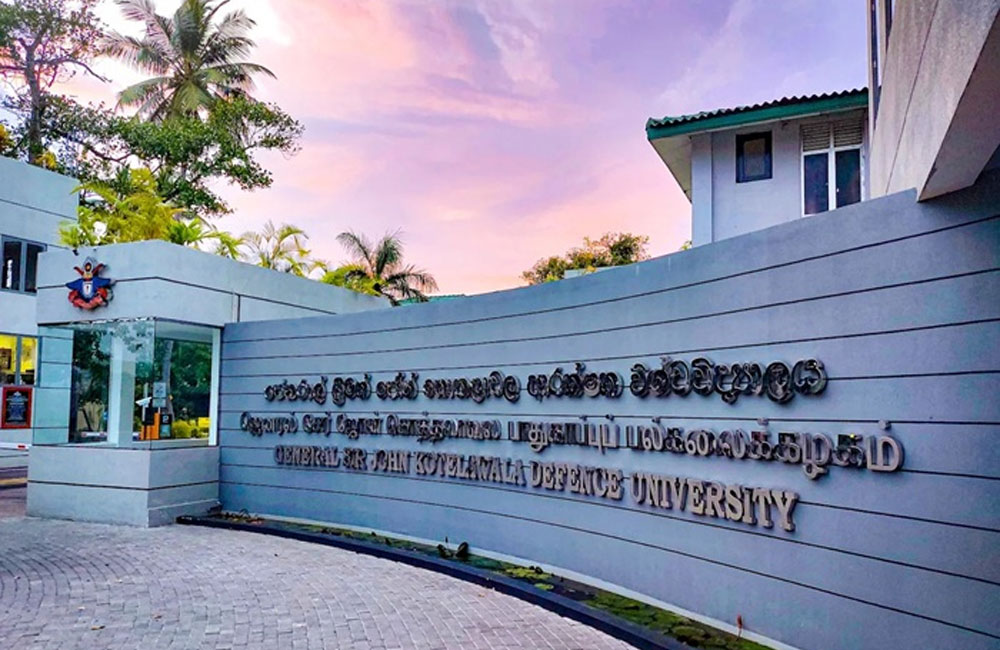
“KDU decision a death blow to free education” – UNPYPO Gen Sec
General Secretary of the United National Party Young Professionals Organisation (Colombo Chapter), Attorney Delan De Silva, has publicly condemned the recent government decision to bar civilian students from entering the Medical Faculty of the General Sir John Kotelawala Defence University (KDU).
In a statement shared on ‘X’, De Silva called the move “a betrayal of our youth” and “a death blow to free education”, adding that it was not a policy, but sabotage.
“Sri Lanka is short by over 15,000 doctors. Each year, nearly 800 students leave to study medicine abroad, draining $700–800 million in foreign exchange. Meanwhile, the Rs. 35 billion teaching hospital at KDU—built with taxpayer funds—is now off-limits to Sri Lankan civilians?” he questioned.
De Silva emphasised that the move deepens the country’s healthcare crisis and erodes public access to state-funded education.
“A university funded by the public cannot become a gated institution for the privileged few. If we are serious about healthcare and equity, this decision must be reversed immediately,” he further urged.
News reports on the government’s decision, which have begun gaining traction online, are being widely shared by legal professionals, educators, and youth activists concerned about the militarisation of education and its implications for public policy.
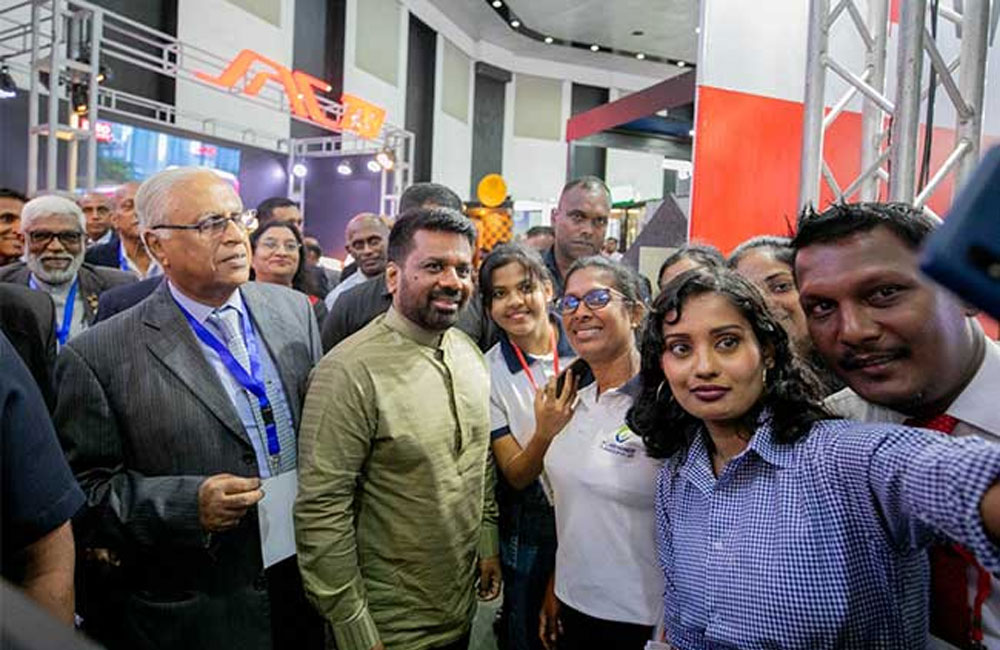
President visits Build SL Housing & Construction Expo 2025
President Anura Kumara Disanayake paid a visit to 20th “Build SL Housing and Construction International Exhibition” organized by the Chamber of Construction Industry of Sri Lanka (CCI), this morning (31).
The Build SL Housing and Construction Exhibition, the premier exhibition of the construction industry in Sri Lanka, commenced yesterday (30) at the Sirimavo Bandaranaike Memorial Exhibition Centre of BMICH in Colombo and will conclude tomorrow (01).
This exhibition features almost 280 product display stalls and it will provide a platform to the construction industry stakeholders to foster relationships, discover business opportunities and gain insights into innovative designs and advanced technologies.
This year, more than 30,000 attendees are expected at the exhibition, providing consumers opportunity to purchase products and services from various international vendors. This year’s exhibition features a diverse selection of eco-friendly building materials that are recognized internationally.
President Anura Kumara Disanayake also toured the exhibition stalls and engaged in discussions with exhibitors and also engaged in cordial discussions with the attendees. (PMD)
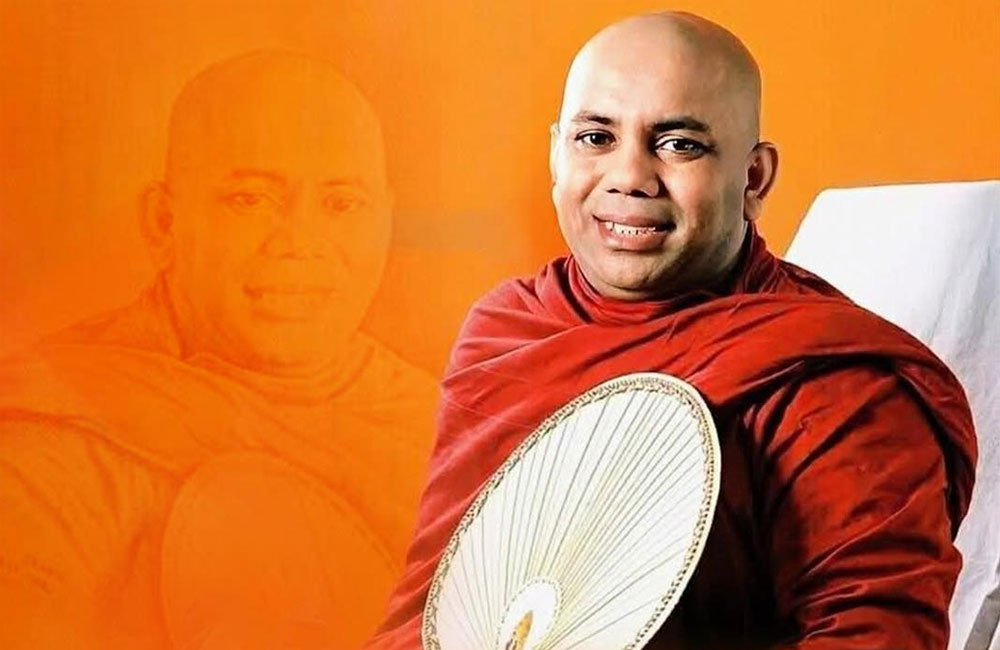
Venerable Bandarawela Amithananda Thera passes away at 62
Venerable Bandarawela Amithananda Thera, a respected Buddhist monk, recognised for his impactful sermons on television and radio, has passed away at the age of 62.
The Thera became a household name among Sri Lankan Buddhists, widely admired for his eloquent preaching and efforts to bring Dhamma teachings to the public. His sermons resonated with devotees across the country, contributing significantly to the revival of Buddhist discourse in modern media.
He had been battling an illness for some time and was receiving long-term care. The Thero passed away this afternoon (May 29) while undergoing treatment at the Colombo National Hospital.
Funeral arrangements are yet to be announced.
Page 2 of 540